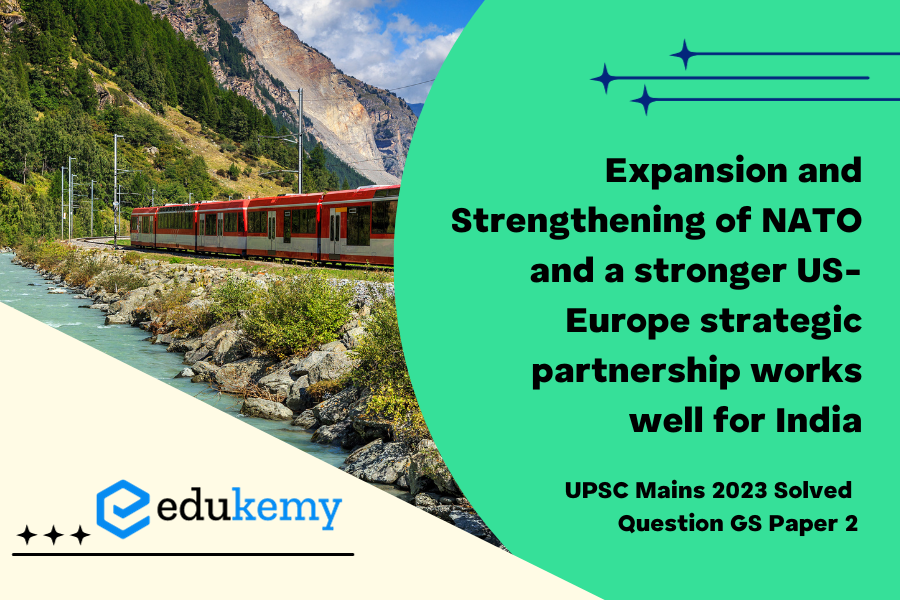UPSC Mains General Studies Paper – 1 Mains 2023
UPSC Mains Civil Services IAS Exam Question Paper – 2023
Contents
Introduction
The dynamism of world geopolitics is a response to establish a balance of power. The recent expansion and strengthening of NATO and a newly found stronger US-Europe strategic partnership in wake of the Russia-Ukraine war is to be viewed in this context.
Body
Consequently, the implications for India are multidimensional-
China-common threat
- NATO, NATO plus 4 (Japan, South Korea, Australia and New Zealand), US-EU Transatlantic agenda and India have a common concern- the rise of China in the Indo-Pacific region.
- The expansion in this regard can act as a balancing act (Build Back Better World) against the rising Chinese axis (claims in South China Sea, etc.) principally fueled by predatory financing (BRI).
Non-traditional threats
- An emergent area of interest, the Indo-Pacific is marred by unregulated fishing, piracy attacks, and others.
- Addressing the non-traditional security concerns, ensuring relatively safer and freer navigation, along with counter-terrorism and establishing rule-based order can be a potential domain of cooperation for India, NATO and subsequent European countries.
Multilateralism
- The historical underpinnings of NATO and its expansion along with the strengthened US-Europe strategic partnership (Russia-Ukraine war) essentially drive the narrative of ‘unipolarity’ which is at loggerheads with India’s principle of abiding by ‘multilateralism’.
Military Alliance
- NATO in its very character is a military alliance and India since NAM (1961) has not been a part of any military alliance.
- Even Quad commonly misplaced is a strategic security dialogue for the Indo-Pacific.
- Expansion of military alliances does not concur with India’s stand of ‘strategic autonomy’ and would lead to militarization of the region, not a part of India’s long term plan.
Counter Arguments
- Perceived Encirclement: Concerns exist that a robust NATO and US-Europe partnership could be misconstrued as encirclement by regional powers like Russia and China. This may strain diplomatic relations, affecting India’s maneuverability.
- Unintended Security Implications: Sceptics fear that increased security cooperation with NATO may inadvertently involve India in conflicts or crises not aligned with its interests, potentially disrupting regional stability.
- Economic Dependency: Critics caution against deepening economic ties with Europe, as excessive reliance on European markets could render India vulnerable to economic downturns. Such reliance might impede diversification of economic partnerships.
- Diverging Interests: Some argue that India’s interests may not consistently align with those of NATO members and Europe. Disagreements on trade, climate policies, or other issues may lead to tensions, negatively impacting India’s interests
Rebuttal
- Mitigating Perceptions of Encirclement: India’s non-alignment policy and active engagement with diverse nations and forums, such as the SCO, balance its foreign policy, dispelling perceptions of encirclement and reaffirming its independent decision-making.
- Selective Security Cooperation: India’s strategic autonomy in security collaboration is demonstrated by its diverse Defence partnerships, including those with Russia and the United States, without compromising its non-alignment principles.
- Diversified Economic Engagement: Simultaneous economic diversification across Asia, Africa, and the Americas while deepening ties with Europe mitigates economic dependency risks and ensures resilience against regional economic fluctuations.
Conclusion
Hence, Conclusively, it can be said that while the expansion of NATO can act as a deterrence in combating Chinese aggression, however there are fundamental differences in ideological underpinnings of the same. Vendetta thus cannot give way to strategic autonomy of India and the ambitions to lead the Global South.
In case you still have your doubts, contact us on 8792740517.
For UPSC Prelims Resources, Click here
For Daily Updates and Study Material:
Join our Telegram Channel – Edukemy for IAS
- 1. Learn through Videos – here
- 2. Be Exam Ready by Practicing Daily MCQs – here
- 3. Daily Newsletter – Get all your Current Affairs Covered – here
- 4. Mains Answer Writing Practice – here


